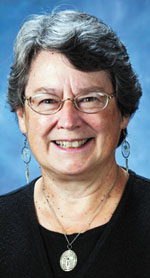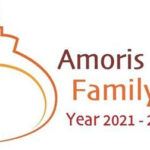By Corrine Winter
As we approach the celebration of Christmas, many Christians seem to be tempted to think of its connection with our salvation only in terms of the birth of the one who would die to save us. Even some Christmas hymns describe Jesus as having “come for to die.” But Christian Tradition provides a much richer understanding of the Incarnation itself as God’s saving gift. The Catechism of the Catholic Church speaks of the effects of the Incarnation in ways that show the influence of early Christian scholars such as Irenaeus of Lyon (second century) and Athanasius of Alexandria (fourth century). Catholic spiritual tradition includes the Angelus prayer which at various times and places has marked morning, noon and evening at the call of the church bells. The versicles surrounding the Hail Mary’s of that prayer come to a pinnacle in the words from the Gospel of John: “The Word was made flesh and dwelt among us.”

In Christian theology, we understand the Incarnation as a source of reconciliation through which the relationship between creation and creator, damaged by sin, is restored. Athanasius, in his work On the Incarnation, describes God as facing a kind of dilemma due to the presence and corruption in the world that God created out of God’s own goodness. While, according to God’s own law, death is the consequence of sin, God’s love cannot stand to see that play out. The Incarnation becomes the divine solution. When the very Word of Creation enters into that creation, the corrupting power is overcome.
The Incarnation thus reveals the truth and power of divine love for the world. According to Athanasius, knowledge of that love is essential to human salvation. When we lose the knowledge of God, we head toward nonexistence because for us “to be” is to be related to God. In that relationship, we find our only true happiness. By being incarnate among us, the Word of God brings us the revelation of God at a level where we may more fully grasp it, and thus saves us from non-existence.
The Incarnation also reveals the truth about the world. Many experiences may tempt us to despair of the world in which we live, to reject it as inherently evil. But by entering into that very messy world, the Son reveals that by the power of the Holy Spirit by whom he is conceived, the world is, in fact, capable of receiving God. Irenaeus of Lyons taught that God created the world in order to call it back to union with God. For Irenaeus, the personal union of God and humanity in Jesus Christ marked the turning point for which all creation had been groaning, the beginning of the return to God.
Again, the Incarnation reveals the human vocation. Athanasius says that the likeness of God in which we are created is a share in the Word who is God’s image within the Trinity. One of Athanasius’ most often quoted statements is that God bore our humanity so that we might bear divinity — that we might share in the very communion of the Father, Son and Holy Spirit.
Athanasius teaches as well that the Incarnation of God in one particular human person affects all people due to the solidarity of humanity. The 20th century theologian Karl Rahner, along with other theologians, also describes the work of Jesus Christ as directly affecting our common humanity. In a way that we do not fully grasp, we are included in the work of Christ.
Finally, the Incarnation is not merely a once upon a time historical event. The union of humanity and divinity in Jesus the Christ remains. Further, the doctrine of the Incarnation provides a foundation for other Catholic teachings and practices. For example, because the Son of God entered into the material world, we believe in the capacity of material things such as bread, wine, water and oil to bear God’s grace to us. We believe that the holy lives of individual saints can be instrumental in our own responses to God.
So, as we celebrate Christmas, let us give thanks to God for the Word made Flesh who dwells among us.
(Corinne Winter is a professor of theology at St. Ambrose University in Davenport.)











